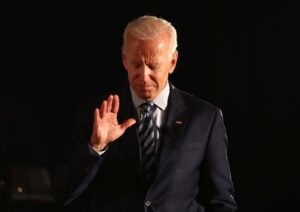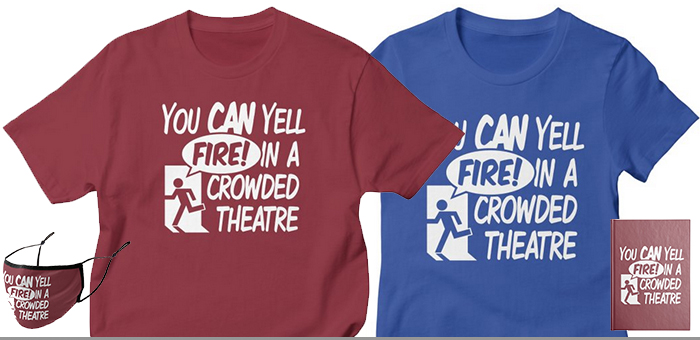Joe Biden Yells A Dumb Anti-Free Speech Trope In An Uncrowded Congress
Remember that precedent that never existed and isn't good law anyway?

(Photo by Justin Sullivan/Getty Images)
Joe Biden has never been a particularly big free speech supporter. For years, as a Senator, he consistently sided with the entertainment industry in their never-ending quest to have the government help attack free speech on the internet via aggressive and oppressive copyright laws. Throughout his campaign he railed against protected speech online that he disliked. And last night, during his first full address to Congress, he trotted out the very dangerous “fire in a crowded theater” trope:
He did it in a very dumb way too. In talking about his push for gun control, he pushed back against the idea that things like background checks and certain limitations on firearms would violate the 2nd Amendment… using the trope about the 1st Amendment:

Early Adopters Of Legal AI Gaining Competitive Edge In Marketplace
This shouldn’t be a red or blue issue. And no amendment to the Constitution is absolute. You can’t yell fire in a crowded theater.
This is unfortunately not the first time Biden has used that line in his push for gun control.
For a decade now, we’ve been explaining why this is not a good thing to say, but apparently people need a big refresher. So, here we go.
First off, the “shouting fire” line was first said by Supreme Court Justice Oliver Wendell Holmes in Schenk v. United States. It was not a precedential statement, but rather what’s known as dicta, basically a judicial aside. Schenk was not about fires in theaters. It was about jailing someone who was morally opposed to war for handing out anti-draft brochures during World War I. If anything the statement should be seen as an example of why and how we need to better protect free speech rights, because when we don’t, and we let people aimlessly say things like “you can’t falsely shout fire in a crowded theater” it leads to jailing people for protesting war — something today we recognize as quintessential protected speech. If people knew the actual history behind the statement, it’s unlikely they’d use it.
Sponsored

Navigating Financial Success by Avoiding Common Pitfalls and Maximizing Firm Performance

Early Adopters Of Legal AI Gaining Competitive Edge In Marketplace

The Business Case For AI At Your Law Firm


The Business Case For AI At Your Law Firm

It never had any precedential value as dicta, but even if it did, the Schenk case is no longer good law. In fact, just months later, Oliver Wendell Holmes basically changed his mind. A few years back, Thomas Healy wrote an entire book about how a bunch of his free speech supporting friends more or less convinced him that he was very, very wrong in Schenk (and a couple of other similar cases), so in the very next term, Holmes suddenly started crafting our modern concepts of 1st Amendment law, in which most speech is absolutely protected. Initially in a set of dissenting opinions (in which his colleagues on the bench continued with the original line Holmes created), Holmes realized that he was totally wrong in Schenk and began saying things like:
I think that we should be eternally vigilant against attempts to check the expression of opinions that we loathe and believe to be fraught with death, unless they so imminently threaten immediate interference with the lawful and pressing purposes of the law that an immediate check is required to save the country.
Decades later, the ruling in Brandenburg v. Ohio effectively overruled Schenk, and began to establish the extremely limited and narrowly defined exceptions to the 1st Amendment.
These later decisions have fashioned the principle that the constitutional guarantees of free speech and free press do not permit a State to forbid or proscribe advocacy of the use of force or of law violation except where such advocacy is directed to inciting or producing imminent lawless action and is likely to incite or produce such action. . . . A statute which fails to draw this distinction impermissibly intrudes upon the freedoms guaranteed by the First and Fourteenth Amendments. It sweeps within its condemnation speech which our Constitution has immunized from governmental control.
Since then a very small number of exceptions have been determined by the courts, but they are very, very, limited. And while someone could craft a scenario in which falsely yelling fire in a crowded theater could potentially fall into one of those buckets, it is extremely unlikely and would be extremely context dependent. In general, saying “you can’t yell fire in a crowded theater” is false.
Sponsored

Is The Future Of Law Distributed? Lessons From The Tech Adoption Curve

Legal AI: 3 Steps Law Firms Should Take Now
Almost universally, any time someone uses that line, they are endorsing unconstitutional suppression of speech, and trying to pretend it might be constitutional because “not all speech is constitutional.” As Ken White rightly notes, that’s what makes the use of this phrase so pernicious:
It’s an old tool, but still useful, versatile enough to be invoked as a generic argument for censorship whenever one is needed. But it’s null-content, because all it says is some speech can be banned — which… is not controversial. The phrase does not advance a discussion of which speech falls outside of the protection of the First Amendment.
[….]
The observation “not all speech is protected” adds nothing to a discussion because it offers no mechanism for determining whether the speech at issue falls into a traditional exception or not.
In other words, the main function of using the “fire in a crowded theater” line, including in Biden’s speech last night, is to say “I’m not going to explain to you why what I want to do is Constitutional, because I can just say the Constitution doesn’t limit everything that I’d want to do.” It’s not only a meaningless statement in that it avoids the important heavy lifting of explaining why what you want to do isn’t unconstitutional, but it brushes that very issue under the rug and says “let’s not explore the issue of Constitutionality, because we can ignore it.”
And doing that while at the very same time effectively defending the jailing of someone for protesting war is shameful and certainly un-Presidential.
For what it’s worth, it appears that the “fire in a crowded theater” line was a stupid improvisation from Biden. It did not appear in the transcript the White House released prior to the speech:
One hopes that someone in the administration who understands the history and problems with that line will tell him to stop using it because it’s extremely problematic, not just in the context of the 2nd Amendment, but very much so in the context of the 1st.
Anyway… if you care about the 1st Amendment and have feelings about this line, have we got a t-shirt (and other gear) for you:
Joe Biden Yells A Dumb Anti-Free Speech Trope In An Uncrowded Congress
More Law-Related Stories From Techdirt:
Senator Marco Rubio: Speech I Disagree With Is Pollution
US Department Of Education Now Investigating Florida Sheriff’s Student ‘Pre-Crime’ Program
Google Says Pretty Much Everything Shields It From Being Sued Over Things Telegram Users Said










